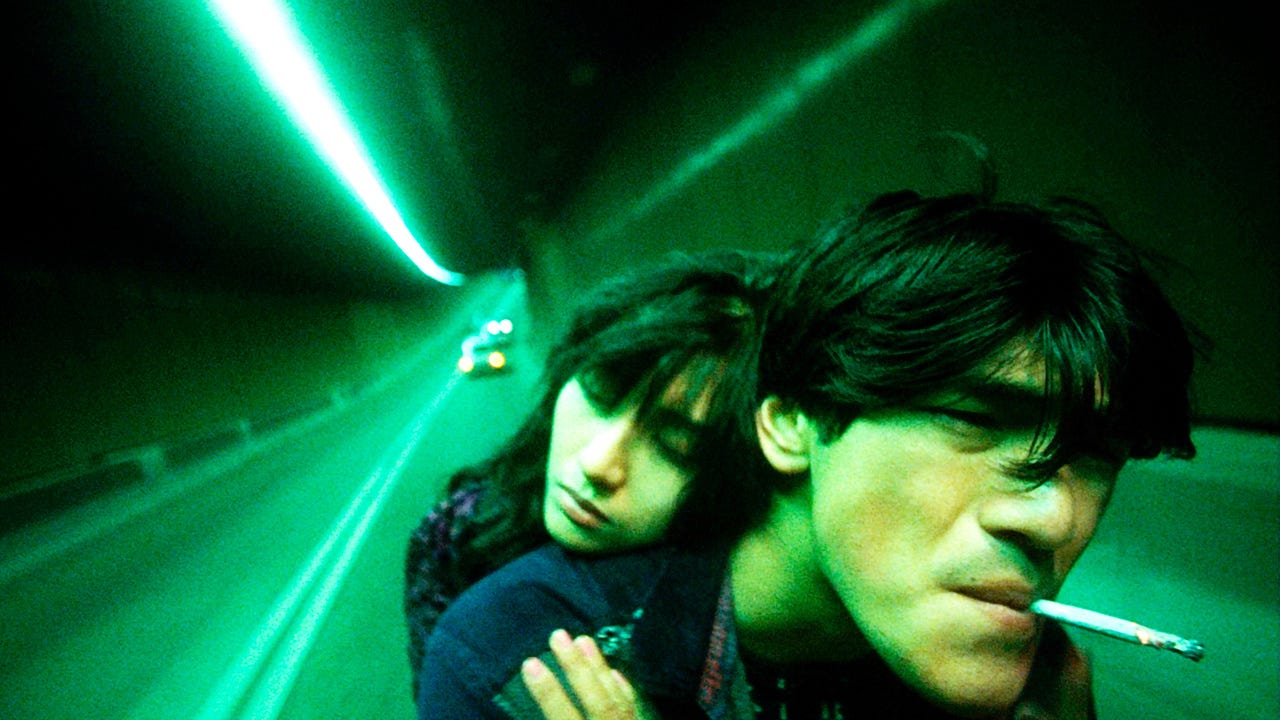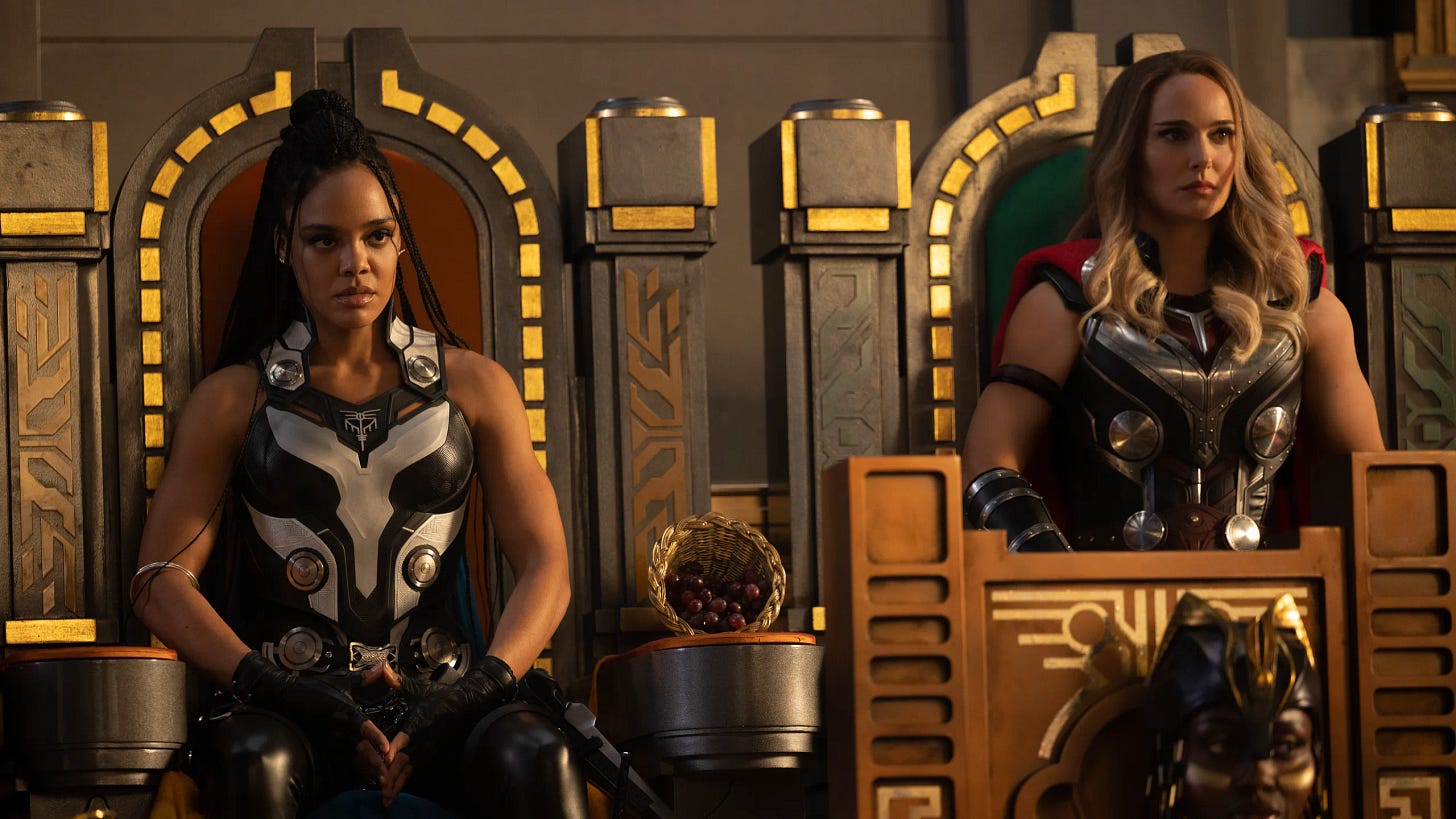The Weekly Reel Re-Boot, July 18
What to watch this week on streaming channels or in theaters, from Hollywood blockbusters to indie streamers.
(Note: this is a test post of a curated guide of viewing recommendations based on select films watched in the past week. In the future, this would turn into a paywall post for subs, but for now, I’d like to work it out and get reader suggestions.)
News of the Week: Bright Lights Film Journal published my first article! It covers the post-Lasseter, Disney+ era of Pixar and how that shift is more of a normal return to Pixar as Disney’s content fodder. Check it out!
Watch Now (aka pick of the week)
If you think you’re familiar with film, but haven’t heard of Wong Kar-wai, then you’re not familiar with film. What he offers is a truly defined, unique approach to filmmaking that’s hard to find elsewhere—not including his imitators. I’ve seen and revered In the Mood for Love in the past, which for most is Wong’s best, then more recently watched Chungking Express, which was Wong’s international break-through. This last week, for my 2022 Criterion challenge, I watched the twin film to his break-through, Fallen Angels, released the year after Chungking but conceived around the same time. The two aren’t dissimilar: dual-narratives of the Kowloon underground life, dynamic and inventive camera techniques and editing, and a sense of playfulness that gives the characters’ near-nihilism some human affection—the genre is romantic crime comedy-drama.
Fallen Angels is two stories for the price of ninety-six minutes. In one, a hit man’s partner/assistant/handler is obsessed with the hit man, which is not unlike a relationship in Chungking. She, unknowingly to him, often sneaks into his apartment in club clothing, tidies it up, then frequents his favorite bar to sit in his favorite seat. The second story is stranger: a mute prison escapee, who lives in the same building as the hit man, breaks into small businesses when they’re closed and sells their goods. Every night he runs into this girl that cries about her boyfriend that left her for a woman, so they team up to find her. The mute guy falls in love with the crying girl, which leads to a series of flooky adventures. I won’t describe the endings, especially for the pick-of-the-week; needless to say, they’re as interesting and satisfying as one could expect from an auteur that had just found his voice and began dominating the medium. Also, instead of wasting your time with TV series, also watch In the Mood for Love and Chungking Express—all three are available to stream on HBO Max, originally from the Criterion Collection.
Save for Later (and watch eventually)
Nuri Bilge Ceylan is one of the most accessible Turkish directors to the international audience. He’s been a regular at the Cannes film festival since his first short film in 1995, eventually winning the Grand Prize of the Jury in 2002 for Uzak, Best Director in 2008 for Three Monkeys, and then the créme de la crêpe Palme d’Or in 2014 for Winter Sleep—my personal Ceylan favorite. His latest is The Wild Pear Tree, a Palme d’Or nominee, which is about a young graduate going back home and trying to secure sponsors to publish his pretentious auto-fictitious home-town meta-novel. He spends his days roaming around, seeing old friends, talking with young imams about life, dealing with his father’s gambling addiction. As is usual for a Ceylan film, characters spend three hours confronting Turkish socio-cultural values, filtered through a flawed protagonist too smart for his own good. And like the interactions in the Before Trilogy, the strength of the story is in the long-winded dialogues that stretch through multiple terrains of tones and topics that transcends the small-town, familial issues on-hand. This film, along with Once Upon a Time in Anatolia and Winter Sleep, is available to watch, for free, on Kanopy.
Another Criterion challenge film I watched was Rainer Werner Fassbinder’s The Marriage of Maria Braun. Fassbinder was one of the peak directors of the New German Cinema movement, a group of post-war Filmemacher intent on giving a voice to societal outsiders. Oftentimes in the press for exceeding polite bourgeois values, Fassbinder was a cinematic explosion that burned bright for a fleeting period: in fifteen years, until his death at thirty-seven, he made forty-three films, two television film series, and twenty-four stage plays. Cinema hadn’t seen this kind of output since the studio factory-line golden age of the thirties, and certainly hasn’t seen it since. Film students rush past this period in film history by watching Fassbinder’s Ali: Fear Eats the Soul, talking about Fassbinder’s transgressions, then moving on to some other country’s movement within the same chapter. Without wanting to give away too much of the plot, The Marriage of Maria Braun takes place directly after the war, in which Maria Braun is searching for her husband, who’s lost, while trying to make ends meet in a city under occupation and in ruins. Luckily, Maria was in the age of upward mobility, so she uses all available resources to push herself out of poverty. You can find out how she does that by streaming the film on HBO Max.
Everyone has their watchlist of films that they push back week after week, year after year, neither finding the right time of day nor proper mood to press play. Well folks, I finally pressed play on Dead Poets Society. I was hesitant because of the type of character this impressed upon society, usually in the form of cringe-thespians thinking they can use carpe diem and Shakespearean sonnets to get laid. I figured enough time had passed—thirty-three years—plus I was in the mood for Robin Williams. He plays a poetry teacher at a rigorous, all-male, college-prep school, who pulls a group of his students out of their stifled lives to enjoy the fruits of their young, creative innocence. The story feels slightly dated now, which many films have re-hashed since, but the ensemble gives the film a solid hang-out vibe—including a fresh-face, pre-Before Sunrise Ethan Hawke. Williams’s character paradoxically feels both more sympathetic in the R.W. post-suicide world but undercut by a similarly sympathetic teacher he portrayed in Good Will Hunting. Therefore, through scientific analysis, the best years to watch Dead Poets Society was between 1989 and 1997, then from 2014 to today. The film is streaming on Hulu.
Pass
It won’t surprise anyone here that I’ll pass on both Thor: Ragnarok and Thor: Love and Thunder. Prompted by a friend who will remain nameless, Jordan, he forced me against my bodily will à la A Clockwork Orange to sit through a couple of duds from a solid—one of the few—comic director, Taika Waititi, who should stick to his Holocaust romps rather than the Aryan God. Love and Thunder was worse than Ragnarok, especially in trying to give characters motivations, which felt rushed and incomplete. The whole cancer sub-plot for Natalie Portman was reminiscent of The Room’s “I definitely have breast cancer.” She went from stage-four cancer victim to Aryan Goddess overnight, then dies later when she isn’t touching the hammer-stick. (An after-the-credits sequence suggests a spinoff of the dead Gods and Goddesses in Elysium with Portman.) Love and Thunder is only for the crowd that enjoyed Ragnarok and/or needs to keep up with the worst phase of the MCU. But Love and Thunder is the antithesis of Ragnarok giving fresh life to Thor through Hemsworth’s comedic abilities, and bringing in a bigger audience to the character than it deserved after The Dark World.
Based on first impressions, Mrs. Harris Goes to Paris is simply a cutesy story for Karens. It’s about a widowed London cleaning lady in 1957 raising enough funds to go to Christian Dior in Paris for a custom-made dress. In the process, Mrs. Harris organizes the Dior work-force to demand the retention of their jobs and bring Dior out of exclusivity to the masses, makes the young Dior financial accountant and Dior’s finest model fall in love, and realizes for herself that love is possible even after the decade-long MIA (or KIA?) of her husband. When it’s all put together, the number of deus ex machinas that occur exceeds the maximum amount for a fantasy on screen to remain credible. And even after leaving the theater, the implication of the story becomes distressingly worse: it’s Mrs. Harris’s dream to own a five-hundred quid dress, and only after getting it is she fulfilled and content with her life. She rides high in Paris, makes life better for those in the upper-class, then descends to her humble life. It’s almost insulting to the working-class. It says to use up all your industrious karma to save Dior from bankruptcy and in the process, a nice dress will elevate your life behind rags. One need not be a Marxist to see the contemptuousness implied. Although the film is obviously just a fantasy to be enjoyed passively, the filmmakers should remember that the audience still has a brain and bills to pay.
Thank you once again for checking out my Substack. Hit the like button and use the share button to share this across social media. And don’t forget to subscribe if you haven’t already done so.






